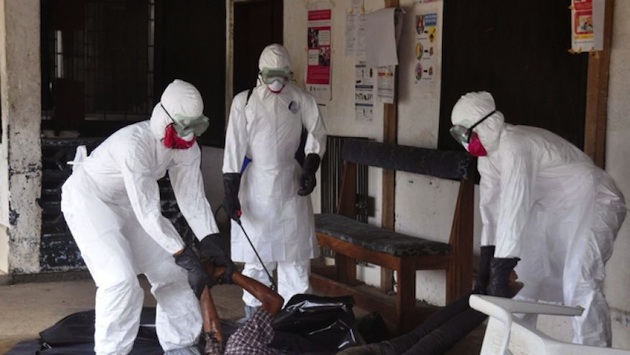

Sept. 16, 2014: Health workers in protective gear help an Ebola virus victim in Monrovia, Liberia. (Photo: AP)
President Obama announced Tuesday that the United States will bank roll a military-led response in West Africa where the deadly Ebola virus is spreading. But while the administration says the outbreak has reached epidemic proportions and now poses “a potential threat to global security,” Americans are less concerned about the deadly disease making its way to the homeland than they were six weeks ago.
A new Rasmussen Reports survey found that nearly as many Americans — 46 percent — aren’t concerned about Ebola in the U.S., while 51 percent remain at least somewhat concerned. Though the majority of Americans still share concern, th new measurement represents a downtick from the 58 percent who said the same in August.
The virus has killed at least 2,400 people in five West African countries, so far. Speaking at the Centers for Disease Control and Prevention in Atlanta, the president said the largest effort in the agency’s 68-years must include the Defense Department because the virus is now “spreading out of control.”
“We have to act fast,” Obama said. “We cannot dawdle on this one. We have to move with force.”
The president did not specifically mention numbers, but earlier reports suggest that upwards of 3,000 military troops will be sent to spearhead a U.S.-led international effort, a larger force than is currently confronting ISIS in Iraq.
“Faced with this outbreak, the world is looking to the United States,” Obama said.
In order to bank roll this effort, the Defense Department has asked Congress for nearly $500 million in existing funds to be put toward the effort.
Liberia, Sierra Leone and Guinea have been hit the hardest by the viral, but it has now reached Nigeria and Senegal. The death toll from the outbreak is expected to reach 10,000 before six months is out, but President Obama said during his remarks that the number could reach the 100,000 if they didn’t take action.
The president’s plan includes training for up to 500 health care workers per week, building 17 health-care facilities capable of housing approximately 100 beds each, and constructing a joint command compound in Liberia where the U.S. will lead international relief efforts. The money will also provide hundreds of thousands ofAfrican households with home health-care kits, including 50,000 that the U.S. Agency for International Development (USAID), itself, will deliver this week.
The survey of 1,000 Adults was conducted on September 12-13, 2014 by Rasmussen Reports. The margin of sampling error is +/- 3 percentage points with a 95 percent level of confidence.







